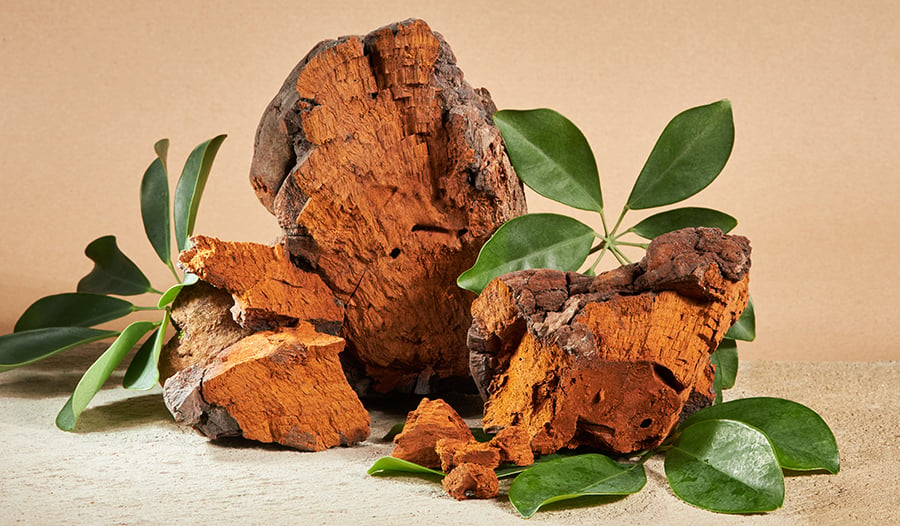
CHaga Mushooms
Chaga Mushroom’s Medicinal Properties
Chaga mushroom is known for its high content of antioxidants, minerals, and bioactive compounds, which contribute to its various health benefits. It has been traditionally used to treat a wide range of ailments, including cancer, digestive issues, and infections.
Research has shown that Chaga mushroom contains several bioactive compounds, such as polysaccharides, triterpenes, and betulinic acid, which have been linked to its anti-inflammatory, antiviral, antitumor, and antioxidant properties. These compounds have been found to help boost the immune system, reduce inflammation, and protect against oxidative stress
Conclusion
The Chaga mushroom has a rich history and originates from cold regions such as Siberia, Russia, Northern Europe, and North America. It has been used for centuries in traditional medicine for its numerous health benefits, which are attributed to its high content of antioxidants, minerals, and bioactive compounds. Although difficult to cultivate and harvest, the Chaga mushroom remains a popular and valuable source of natural medicine.
The Chaga mushroom (Inonotus obliquus) is known for its medicinal properties and has been used in traditional medicine for centuries. Below are some of the properties and health benefits associated with consuming Chaga:
Antioxidant Properties: Chaga is rich in antioxidants, such as polyphenols and flavonoids, which help combat oxidative stress in the body. These compounds can protect cells from damage caused by free radicals, which in turn can help prevent chronic diseases and premature aging.
Anti-inflammatory Potential: Chaga has been suggested to possess anti-inflammatory properties, meaning it may help reduce inflammation in the body. This could be beneficial for people with inflammatory conditions such as arthritis.
Strengthening the Immune System: Chaga consumption has been associated with a strengthening of the immune system. It is believed that certain compounds present in the fungus can stimulate the activity of immune cells, which could help the body defend against infections and diseases.
Possible Anticancer Effect: Some preliminary studies suggest that Chaga could have anticancer properties. Certain compounds present in the fungus have been observed to have inhibitory effects on the growth of cancer cells in laboratory studies, although more clinical research is needed to confirm these effects in humans.
Digestive Health Support: Chaga has also been linked to digestive health benefits. It is believed that it can help promote gastrointestinal health and relieve problems such as gastritis and stomach ulcers.
Blood Sugar Balance: Some studies have suggested that Chaga may have a positive effect on blood sugar balance, which could be beneficial for people with diabetes or those at risk of developing this condition.
Improved Mental Health: It has been hypothesized that Chaga could have positive effects on mental health. Some researchers suggest that certain compounds present in the mushroom could have neuroprotective properties and potentially benefit cognitive function.
In summary, Chaga is a mushroom with a wide range of potential health properties, including its antioxidant, anti-inflammatory, immunomodulatory and possibly anti-cancer capabilities. However, it is important to note that further clinical research is needed to confirm many of these potential benefits and determine optimal doses for therapeutic use.
Main Chaga Vitamins
Chaga, also known as Inonotus obliquus, is a medicinal mushroom that has been used for centuries in traditional medicine in several countries. This mushroom is known to be a rich source of nutrients, including vitamins and minerals. The main vitamins present in chaga include:
Vitamin D: Chaga is one of the few natural sources of vitamin D. Vitamin D is crucial for bone health, immune function, and regulating calcium levels in the body.
Vitamin B: Chaga contains several B vitamins, including B2 (riboflavin), B3 (niacin), B5 (pantothenic acid), and B9 (folic acid). These vitamins play an important role in energy metabolism, cardiovascular health, and brain function.
Vitamin K: Chaga is also a source of vitamin K, which is crucial for blood clotting and bone health.
Vitamin C: Chaga contains vitamin C, an important antioxidant that supports the immune system and contributes to skin health.
These vitamins make chaga a valuable nutritional supplement that can provide a wide range of health benefits. However, it is important to note that the exact concentration of these vitamins may vary depending on the method of preparation and extraction of chaga.
In summary, chaga is a natural source of several important vitamins, including vitamin D, B vitamins, vitamin K, and vitamin C, making it a beneficial nutritional supplement for your health.